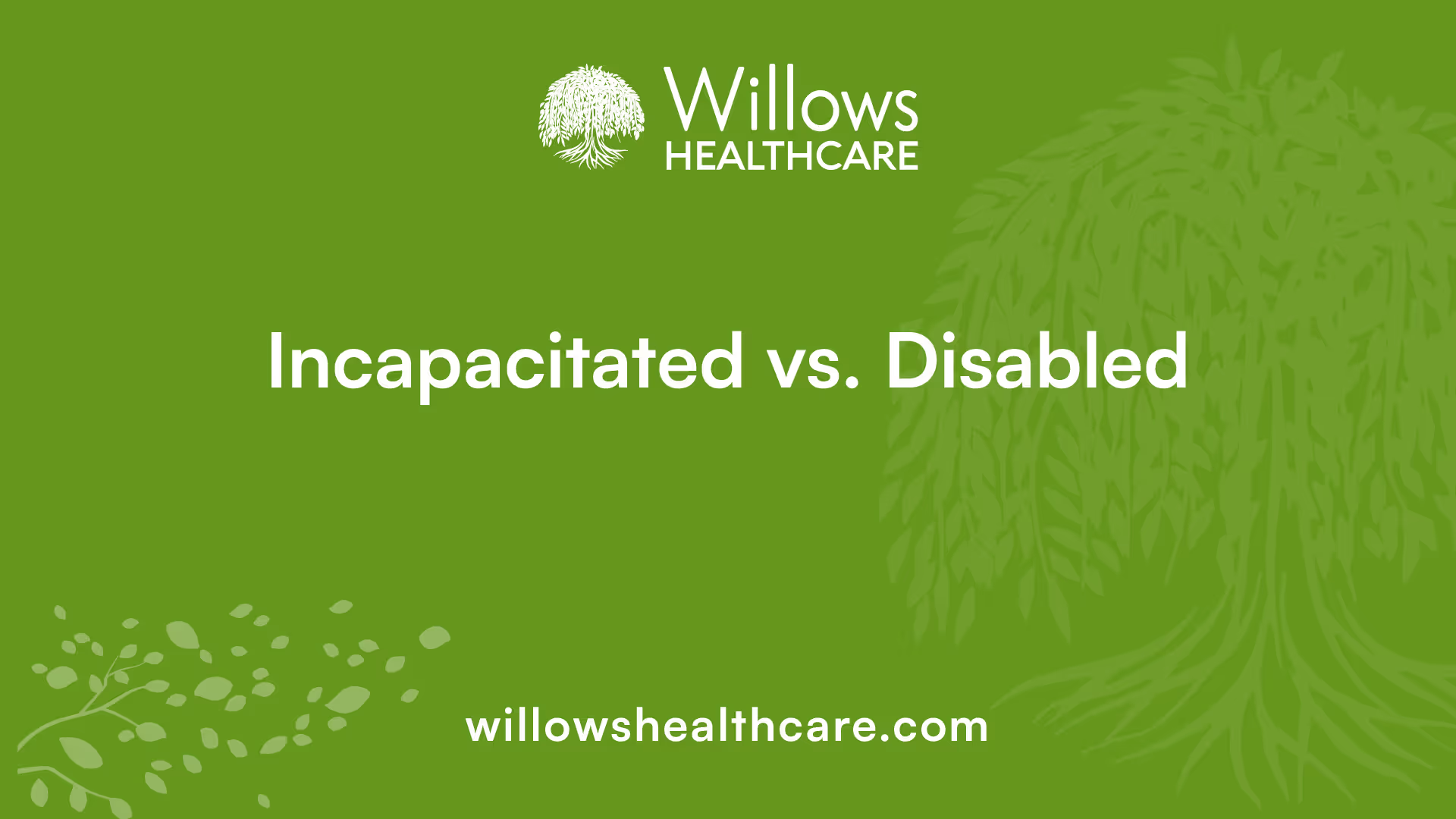Guardianship of Incapacitated or Disabled Persons
March 18, 2025
Discover the intricacies of guardianship for incapacitated or disabled individuals, from legal frameworks to responsibilities.


Understanding Guardianship
When it comes to caring for incapacitated or disabled individuals, the legal concept of guardianship plays a significant role. Understanding what guardianship entails and the legal framework surrounding it is essential in ensuring the well-being and protection of vulnerable individuals.

What is Guardianship?
Guardianship is a legal relationship where a court appoints an individual or entity to make decisions on behalf of someone who is deemed incapacitated or disabled. The appointed guardian, also known as a conservator, assumes the responsibility for managing the personal affairs, finances, and healthcare decisions of the incapacitated person.
Legal Framework for Guardianship
The legal framework for guardianship varies depending on the jurisdiction, but it typically involves a formal legal process overseen by the court. This process aims to determine the individual's capacity to make decisions for themselves and assess whether guardianship is necessary to safeguard their best interests.
One key aspect of the legal framework is the establishment of different types of guardianship arrangements, such as full guardianship, limited guardianship, and temporary guardianship. Each type of guardianship serves a specific purpose based on the individual's unique needs and circumstances.
By understanding the legal foundation of guardianship, individuals and families can navigate the complexities of caring for incapacitated or disabled loved ones while adhering to the required legal procedures and safeguards.
Types of Guardianship
When it comes to guardianship for incapacitated or disabled individuals, there are different types of arrangements that can be put in place to ensure their well-being and protection. These include full guardianship, limited guardianship, and temporary guardianship.

Full Guardianship
Full guardianship, also known as plenary guardianship, grants the guardian the broadest authority to make decisions on behalf of the incapacitated or disabled individual. This type of guardianship is typically established when the individual is deemed fully incapacitated and unable to make decisions regarding their personal, financial, or healthcare matters.

Limited Guardianship
Limited guardianship, on the other hand, grants the guardian specific powers and responsibilities as outlined by the court. This type of guardianship is established when the individual is considered capable of making some decisions but requires assistance in specific areas. It aims to preserve the individual's autonomy and independence to the extent possible.

Temporary Guardianship
Temporary guardianship is a short-term arrangement that is put in place to address urgent or immediate needs. This type of guardianship is often established when there is an emergency situation or when a permanent guardian has not been appointed yet. Temporary guardianship provides interim decision-making authority until a more permanent solution is determined.

Understanding the distinctions between full, limited, and temporary guardianship is crucial in determining the most suitable option for the unique circumstances of the incapacitated or disabled individual. Each type of guardianship serves a specific purpose in safeguarding the individual's interests and ensuring their care and protection in compliance with legal requirements and ethical standards.
Incapacitated vs. Disabled
When it comes to guardianship, understanding the distinction between incapacitated and disabled individuals is fundamental. While both terms are often used interchangeably, they represent distinct legal definitions and implications.

Definitions and Differences
- Incapacitated Individuals: Often referred to as legally incapacitated persons, these individuals are deemed unable to make informed decisions due to factors such as cognitive impairment, mental illness, physical disability, or age-related conditions. Guardianship for incapacitated persons is typically sought to protect their best interests and ensure their well-being.
- Disabled Individuals: Disabled individuals, on the other hand, encompass a broader spectrum of conditions that may impact their physical, mental, intellectual, or sensory abilities. Disability can range from mild to severe and may or may not impact an individual's decision-making capacity. Not all disabled persons require guardianship, as many are fully capable of managing their affairs with appropriate support and accommodations.
It's important to recognize that not all disabled individuals are legally incapacitated, and vice versa. The determination of whether guardianship is necessary depends on the individual's specific circumstances and level of decision-making ability.
Assessment for Guardianship
The process of assessing an individual for guardianship involves a thorough evaluation of their mental and physical capabilities, as well as their capacity to comprehend and make informed decisions. This assessment is crucial in determining whether the individual meets the criteria for guardianship and to what extent guardianship may be required.
During the assessment for guardianship, various factors are considered, including:
- Medical and Psychological Evaluations: Health professionals assess the individual's cognitive function, mental health status, and overall well-being to determine their capacity to make decisions.
- Functional Assessment: The individual's ability to perform daily tasks, manage personal care, and handle financial matters is evaluated to gauge their level of independence.
- Support Systems: The presence of family members, caregivers, or other support networks is taken into account to assess whether alternate decision-making arrangements can be implemented without the need for guardianship.
- Legal Considerations: Legal experts review the individual's rights, existing legal documents, and any advance directives to ensure that guardianship aligns with their wishes and best interests.
By conducting a comprehensive assessment tailored to the individual's unique circumstances, guardianship proceedings can be approached with sensitivity, respect for autonomy, and a focus on promoting the individual's rights and well-being.
Process of Obtaining Guardianship
When it comes to obtaining guardianship for an incapacitated or disabled individual, the process involves several key steps. Understanding the procedural aspects is essential for anyone navigating the legal framework surrounding guardianship.
Petitioning the Court
The first step in the process of obtaining guardianship is filing a formal petition with the court. The individual seeking guardianship, known as the petitioner, must submit a legal document outlining the reasons for seeking guardianship and providing relevant information about the incapacitated or disabled person. This petition serves as the initial request for the court to consider appointing a guardian.
Evaluation Process
Following the submission of the petition, the court typically initiates an evaluation process to assess the need for guardianship. This evaluation may involve medical professionals, social workers, or other relevant experts who will evaluate the incapacitated or disabled individual's mental and physical capacity to make decisions regarding their personal and financial affairs. The evaluation helps the court determine whether guardianship is necessary and what type of guardianship would be most suitable.
Court Decision and Appointment
Once the evaluation process is complete, the court reviews the findings and decides whether to grant guardianship. If the court deems guardianship appropriate, a formal legal proceeding is held to appoint a guardian. The appointed guardian then assumes the responsibilities outlined by the court, which may include making decisions on behalf of the incapacitated or disabled person, ensuring their well-being, and managing their affairs in accordance with the court's directives.
The process of obtaining guardianship can be complex and involve legal nuances that vary by jurisdiction. It's crucial for individuals considering guardianship to seek legal counsel and guidance to navigate the process effectively and ensure the best interests of the incapacitated or disabled person are upheld. It's also important to explore alternatives to guardianship, such as supported decision-making, power of attorney, or healthcare proxies, to determine the most appropriate course of action based on the individual's unique circumstances.
Responsibilities of a Guardian
In the realm of guardianship for incapacitated or disabled individuals, guardians have specific roles and obligations that are essential to ensuring the well-being and protection of the individuals under their care. Here, we delve into the key responsibilities of a guardian, which encompass decision-making authority, duty of care, and reporting requirements.
Decision-Making Authority
One of the primary responsibilities of a guardian is to exercise decision-making authority on behalf of the incapacitated or disabled individual. This authority enables the guardian to make crucial choices regarding the individual's personal, medical, financial, and legal affairs. The guardian is entrusted with the task of acting in the best interests of the individual, considering their well-being and needs when making decisions.
Duty of Care
A fundamental obligation of a guardian is to uphold a duty of care towards the individual under guardianship. This duty encompasses providing for the individual's basic needs, such as food, shelter, clothing, and medical care. The guardian is responsible for ensuring that the individual receives the necessary support and assistance to lead a dignified and fulfilling life. Additionally, the guardian must advocate for the individual's rights and ensure they are treated with respect and dignity at all times.
Reporting Requirements
Guardians are required to fulfill reporting requirements to the court overseeing the guardianship arrangement. These reports typically detail the guardian's activities, decisions made on behalf of the individual, the individual's well-being and living conditions, and any changes in circumstances that may impact the guardianship. By providing regular updates and reports, the guardian allows the court to monitor the guardianship arrangement and ensure that the individual's best interests are being served.
Ensuring that these responsibilities are carried out diligently and ethically is paramount in the role of a guardian. By upholding decision-making authority, fulfilling the duty of care, and meeting reporting requirements, guardians play a crucial role in safeguarding the rights and welfare of incapacitated or disabled individuals under their guardianship.
Alternatives to Guardianship
When considering the care and decision-making for incapacitated or disabled individuals, guardianship is not the only option available. There are several alternatives that serve as less restrictive ways to support and empower individuals in need. Three notable alternatives to guardianship include supported decision-making, power of attorney, and healthcare proxy.
Supported Decision-Making
Supported decision-making is a person-centered approach that allows individuals to make their own decisions with the assistance of trusted individuals or support networks. This alternative emphasizes the individual's autonomy and self-determination while providing the necessary guidance and assistance to ensure that decisions are made in their best interest.
Key Features of Supported Decision-Making
Collaborative decision-making process
Focus on individual preferences and choices
Establishment of a support network
Regular communication and guidance
Supported decision-making can be tailored to the specific needs and abilities of the individual, promoting their independence and active participation in decision-making processes related to their care and well-being.
Power of Attorney
A power of attorney is a legal document that grants a designated individual the authority to make decisions on behalf of another person, known as the principal. The appointed individual, referred to as the attorney-in-fact or agent, can make financial, legal, and healthcare decisions based on the powers outlined in the document.
Types of Power of Attorney
General Power of Attorney
Limited Power of Attorney
Durable Power of Attorney
Medical Power of Attorney
By establishing a power of attorney, individuals can designate a trusted individual to act on their behalf in specific or overarching matters, providing a structured framework for decision-making in the event of incapacity or disability.
Healthcare Proxy
A healthcare proxy, also known as a healthcare power of attorney or surrogate decision-maker, is a legal document that designates an individual to make medical decisions on behalf of another individual if they are unable to do so. The appointed healthcare proxy has the authority to communicate with healthcare providers and make healthcare decisions in accordance with the individual's wishes or best interests.
Responsibilities of a Healthcare Proxy
Advocating for the individual's healthcare preferences
Communicating with healthcare providers
Making medical decisions in alignment with the individual's values and beliefs
Ensuring the individual receives appropriate medical care
By appointing a healthcare proxy, individuals can ensure that their medical preferences and values are respected and upheld, even when they are unable to communicate or make decisions themselves.
Exploring these alternatives to guardianship provides individuals with a range of options to promote autonomy and person-centered decision-making while safeguarding the well-being and interests of incapacitated or disabled individuals effectively.
Sources
https://www.mass.gov/guardianship-conservatorship-of-incapacitated-persons#:~:text=
https://www.findlaw.com/family/guardianship/guardianship-of-incapacitated-or-disabled-persons.html













